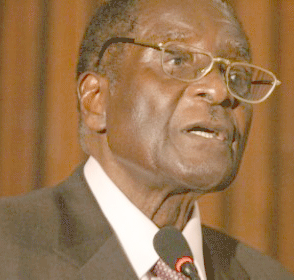
THE collapse of Bulawayo’s industries had nothing to do with sanctions imposed on Zimbabwe by Western countries, but was caused by poor government policies, a local analyst has said. SILAS NKALA STAFF REPORTER
Bulawayo has over the years lost its status as the industrial hub of Zimbabwe due to company closures and relocations.
Butler Tambo, a policy analyst, told a Zimbabwe Chamber of Informal Economy Associations conference held in Bulawayo last week that the deindustrialisation had driven more people into the informal sector.
“There are claims that sanctions are the reason why there is deindustrialisation and people continue to lose jobs, but I do not think that the closure of companies is due to sanctions,” he said.
“Deindustrialisation has resulted in people joining the informal sector and in year 2000 research showed that the informal sector had $4,2 billion in circulation.
President Robert Mugabe last year described Bulawayo as a scrap yard and vowed to use his current term to turn around the fortunes of the city.
Mugabe often blames the collapse of the economy in general to sanctions imposed by the West on his inner circle for alleged human rights violations.
The European Union last week lifted the suspension on direct financial aid to the government of Zimbabwe, but maintained the embargo on Mugabe and his lieutenants. However, the government has been criticised for dragging its feet in securing a rescue package for the Bulawayo’s distressed companies.
- Chamisa under fire over US$120K donation
- Mavhunga puts DeMbare into Chibuku quarterfinals
- Pension funds bet on Cabora Bassa oilfields
- Councils defy govt fire tender directive
Keep Reading
Tambo urged the Bulawayo City Council to provide informal traders with proper facilities as they are now the back bone of the economy.
Council also needs to decentralise the licensing of traders to bring sanity to the informal economy, he said.
“The council must put in place policies, which are in tandem with the current economic conditions considering the fact that it is known that many people are not working and the informal sector has become the major source of income for many,” Tambo said.
Bulawayo Agenda director Mmeli Dube said the government must ensure that the dignity of vendors is restored.
He said the only way vendors could be removed from the streets was through accelerated job creation. Tambo said the informal sector had become the main economic driver in the country and there was need for government policies to reflect the changing environment.
“The country’s 2014 budget is $4,1 billion while the money circulating in the informal market is said to be $7 billion,” he said.
“If the money you have could be lent to the government, it can run the nation for two years in expenditure. That shows the power and importance you have in the country yet you do not recognise it yourself.”
But Tambo emphasised that despite the boom, the informal sector was not immune to problems dogging the mainstream economy.
“The biggest problems that the informal sector faces include difficulties in acquiring loans from the banks,” he said.
“The banks will tell you that you are not registered. Most of you do not bank your money because you lost trust in the financial sector.”










